Roses are among the most beloved flowers, adorning gardens with vibrant colors and enchanting fragrances. However, these delicate blooms often prey on pesky insects that wreak havoc on their health and beauty. Using natural remedies to combat pests on Rose plants is effective and safer for the environment and your family.
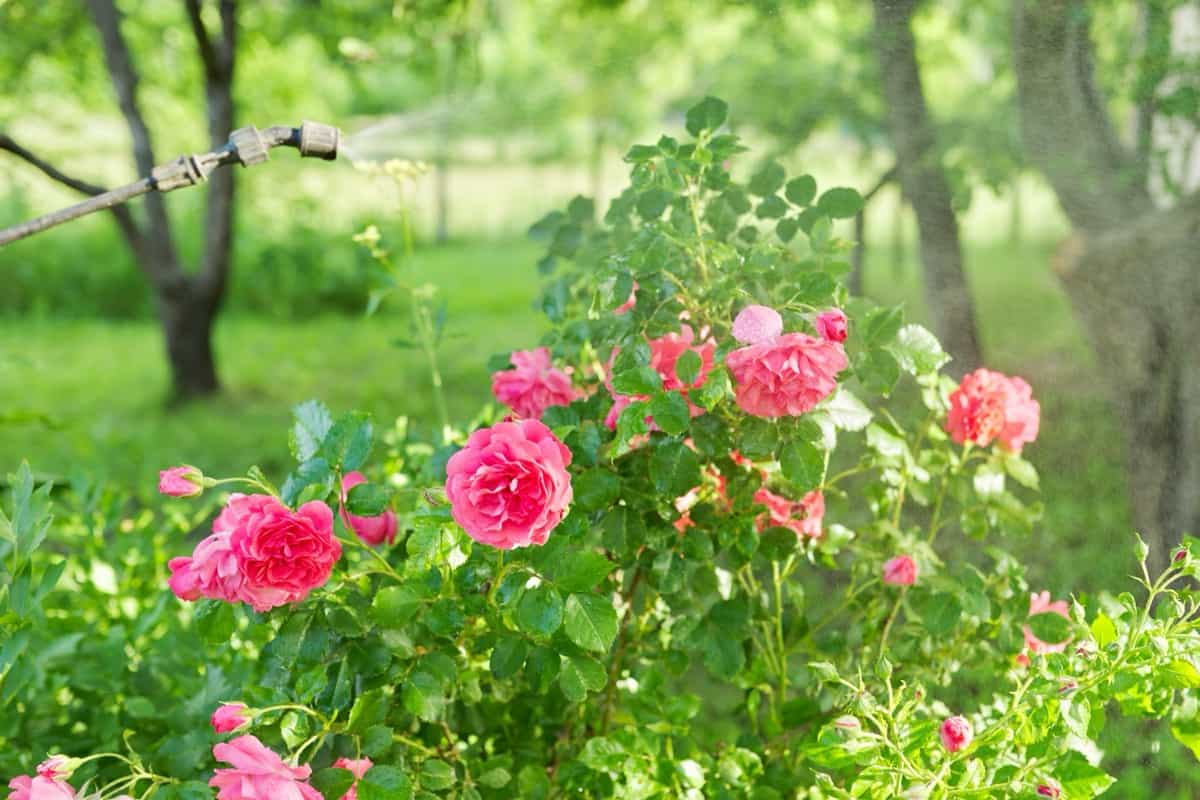
Chemical-based insecticides may eliminate unwanted bugs but can also harm beneficial insects. By relying on homemade solutions, you can protect your precious Roses without compromising the well-being of other creatures in your garden. Plus, making your pest control concoctions is surprisingly easy and cost-effective.
Homemade Insecticide for Roses
Why Natural Pest Control is Important for Rose Plants
Regarding caring for our beloved Rose plants, pest control has become a top priority. However, chemical insecticides can negatively affect pests, the environment, and our health. That’s why natural pest control methods are gaining popularity among gardeners. Natural pest control for Roses offers several benefits.
It avoids the risk of chemical residues entering the soil or water sources, ensuring a safer environment for humans and other organisms. Embracing natural alternatives also promotes sustainability in gardening practices by reducing reliance on synthetic chemicals that may harm biodiversity over time.
Common Pests that Harm Rose Plants
Rose plants are susceptible to various pests, so identifying them early on is important to prevent damage. One common pest is aphids, tiny insects that suck the sap from Rose leaves and buds. These pesky creatures can cause wilting and deformities in the plant. Another common pest is the spider mite.
These microscopic pests create fine webs on the underside of leaves, sucking out vital nutrients and causing yellow spots or stippling on foliage. Thrips are another enemy of Rose plants. These slender insects feed on flower buds, causing discoloration and deformation. Rose slugs, not actual slugs but larvae of sawflies, can also wreak havoc by chewing through leaf tissue. Their presence results in skeletonized leaves with only veins remaining intact.
Using Essential Oils as Homemade Pest Control for Roses
Essential oils are great for aromatherapy and can also be a powerful tool in controlling pests on Rose plants. These natural oils contain compounds that repel insects and help keep your Roses healthy and pest-free. One popular essential oil for homemade pest control is peppermint oil. Its strong scent deters many common pests, such as aphids, spider mites, and beetles. Mix one teaspoon of peppermint oil and water and apply it to the leaves of your Rose plants.
In case you missed it: How to Identify and Treat Black Spots on Rose Leaves: Preventative and Damage Control Methods
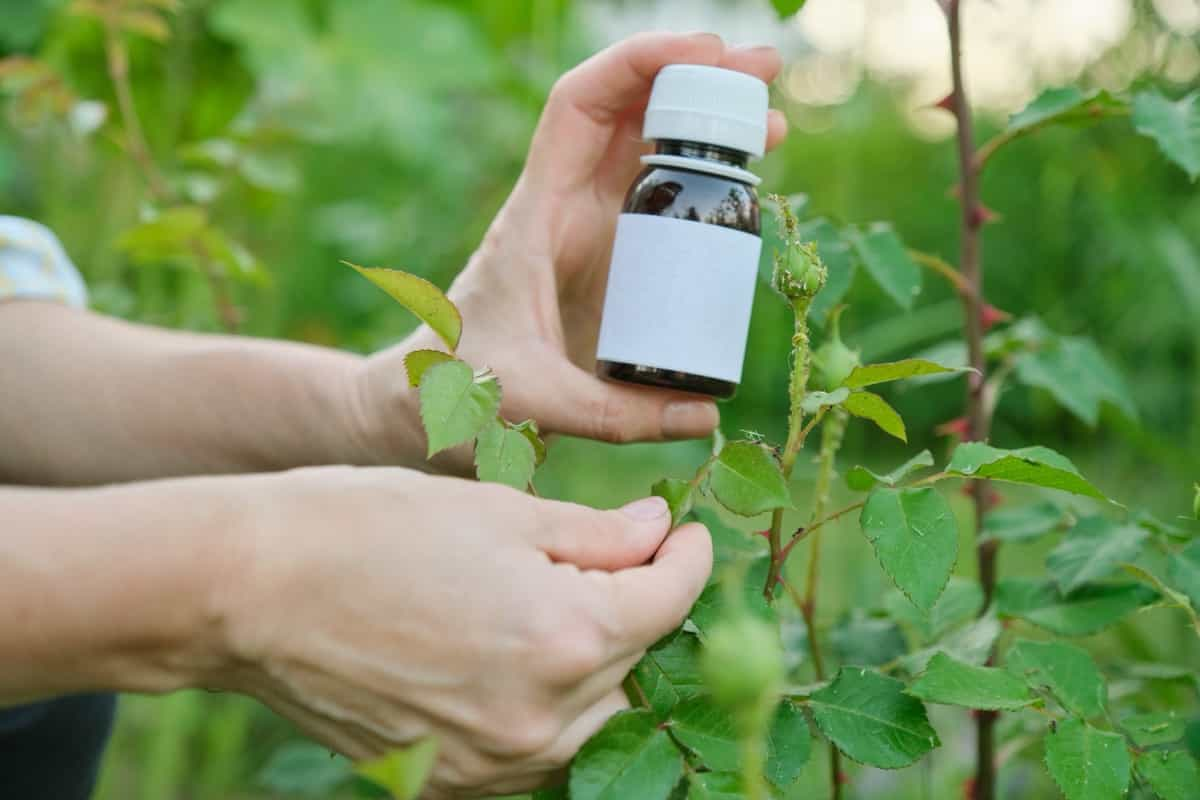
Another effective essential oil is lavender oil. Not only does it have a calming aroma, but it also works wonders at repelling pests like fleas, ants, and moths. Mix lavender oil with water or carrier oil (such as coconut or olive oil) and spray it on the foliage of your Roses. Rosemary essential oil is particularly helpful against thrips, tiny insects that feed on Rose petals, causing them to turn brown and shrivel up. Mix Rosemary oil with water and spray it onto the affected areas of your Roses.
Neem Oil: A Potent Homemade Insecticide for Roses
The active compounds in neem oil interfere with pests’ feeding habits and reproductive abilities, ultimately reducing their population on your Rose plants. To make a homemade neem oil spray, mix 1-2 tablespoons of pure neem oil with one gallon of water. Shake well before each use to ensure proper emulsification.
Spray this solution onto your Rose plants, focusing on both sides of the leaves where pests tend to hide. It’s important to note that while neem oil is an effective natural pest control option for Roses, it should be used sparingly and with caution. Excessive application can harm beneficial insects such as bees or ladybugs. Additionally, avoid spraying during hot temperatures or when direct sunlight is present, as it may cause leaf burn.
Garlic Spray: A Reliable Natural Pest Control for Roses
Garlic can also be an effective natural pest control for Roses, not just for adding flavor to your favorite dishes. Its strong smell and taste are a reliable deterrent for many common pests that harm Rose plants. To create a garlic spray, simply crush several garlic cloves and mix them with water. Let the mixture sit overnight so that the active compounds in the garlic have time to infuse into the water.
Then, strain out any solid particles and transfer the liquid into a spray bottle. Apply garlic spray on your Roses evenly on both sides of the leaves and around the stem. This will create a protective barrier against insects like aphids, spider mites, and even whiteflies. The pungent aroma of garlic repels these pests, making them less likely to infest your precious Roses. Plus, since you’re using natural ingredients instead of harsh chemicals, you don’t have to worry about harming beneficial insects or contaminating your garden.
Remember, though, homemade remedies like garlic spray may need repeated applications every few days or after rain showers since they are less long-lasting than synthetic pesticides. But with dedication and regular use, you can keep those pesky pests at bay while maintaining healthy and beautiful Rose plants.
Simple Homemade Insecticide with Soap Solution
One effective and easy-to-make homemade insecticide for Roses is a simple soap solution. This natural pest control method can help you keep those pesky bugs at bay without using harmful chemicals. You only need some liquid dish soap and water to create the soap solution. Mix about one tablespoon of liquid dish soap into a gallon of water, ensuring it’s fully dissolved.
In case you missed it: Brilliant Ways to Propagate Roses from Cuttings
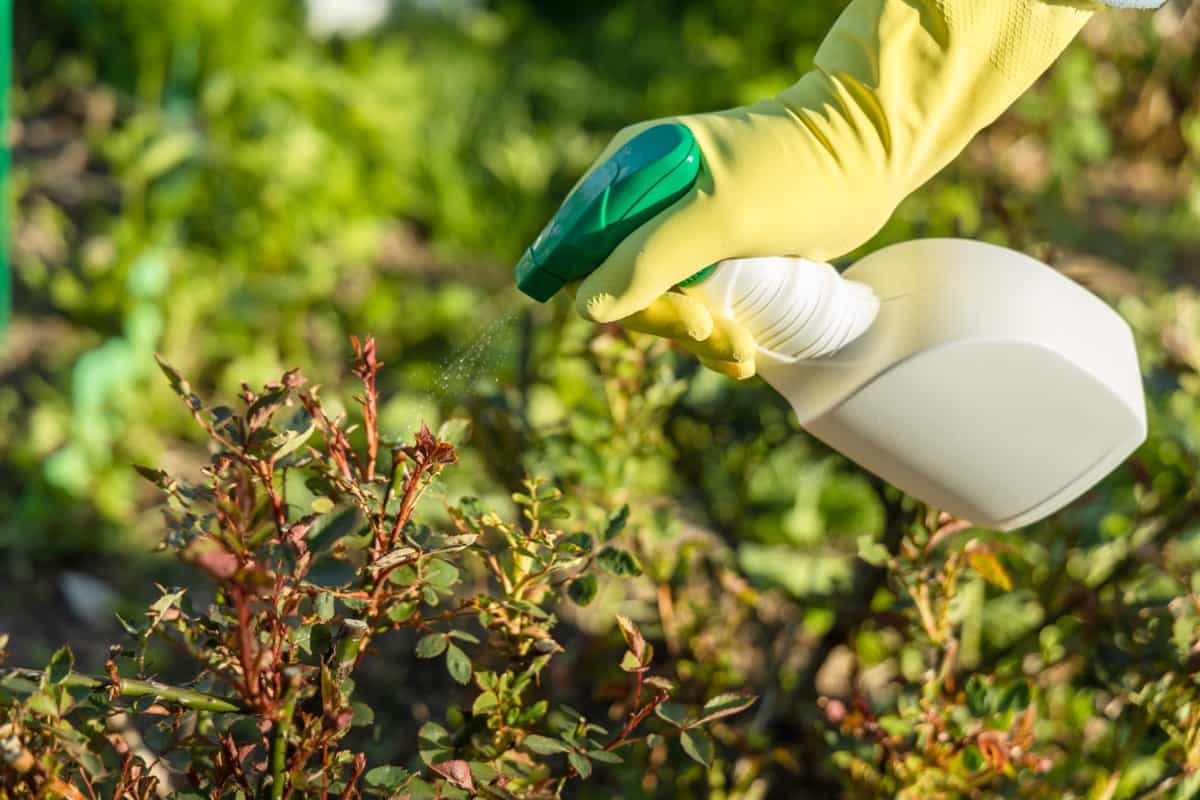
When pests attack your Rose plants, spray the soap directly onto the affected areas. The soapy residue will suffocate insects like aphids, spider mites, and whiteflies by blocking their breathing pores. Remember to thoroughly coat both sides of the leaves and any stems or buds where pests hide. Applying this homemade insecticide in the early morning or late evening when temperatures are cooler is best to avoid damaging your plants in direct sunlight.
Spicy Chili Pepper Spray for Controlling Rose Plant Pests
A spicy chili pepper spray is one of the most effective homemade remedies for natural pest control on Rose plants. Not only does it repel pests, but it also acts as a deterrent to prevent them from returning. To make this DIY insecticide, simply blend fresh chili peppers with water until you have a smooth paste. Dilute it with water if desired, depending on how potent you want your spray to be. When sprayed directly onto the leaves and stems of Rose plants, the capsaicin in chili peppers irritates and repels common pests like aphids, spider mites, and thrips.
This natural deterrent works by disrupting their feeding patterns and deterring them from infesting your precious Roses. It’s important to note that this spicy chili pepper spray should be used sparingly and applied carefully. Avoid spraying during hot or sunny days, as it may cause damage to your plants due to heat stress. Additionally, always wear gloves when handling chili peppers to protect your skin from irritation.
Tomato Leaf Spray to Protect Roses
Tomato leaf spray is one effective homemade remedy for natural pest control on Rose plants. This method utilizes the power of tomato leaves to repel and deter pests that harm Roses. To make a tomato leaf spray, simply chop a handful of fresh tomato leaves into small pieces. Place the chopped leaves into a container with two cups of water and let it steep overnight.
The next day, strain the mixture to remove any solids, then transfer it into a spray bottle. When applying the tomato leaf spray to your Rose plants, cover both sides of the leaves thoroughly. The strong odor emitted by the tomatoes is a repellent against aphids, whiteflies, and other common pests that can damage your Roses.
It’s important to note that this homemade insecticide should be used as soon as you notice signs of pest infestation on your Rose plants. Regular application every one to two weeks will help keep these unwanted visitors at bay. Using natural ingredients such as tomato leaves, you can protect your beloved Roses without using harmful chemicals that may negatively affect beneficial insects or yourself.
Repelling Rose Pests with Homemade Onion Insecticide
If you’re looking for a natural and effective way to keep unwanted pests away from your precious Rose plants, look no further than homemade onion insecticide. Onions are not only a staple in the kitchen but can also serve as a powerful deterrent for pesky insects. To create this homemade insecticide, finely chop or blend one medium-sized onion. Then, mix it with two cups of water and let it sit overnight. The next day, add 2 to 3 drops of dish soap.
In case you missed it: Insect Pests of Rose Plants: Chemical, Organic, and Natural Control Management
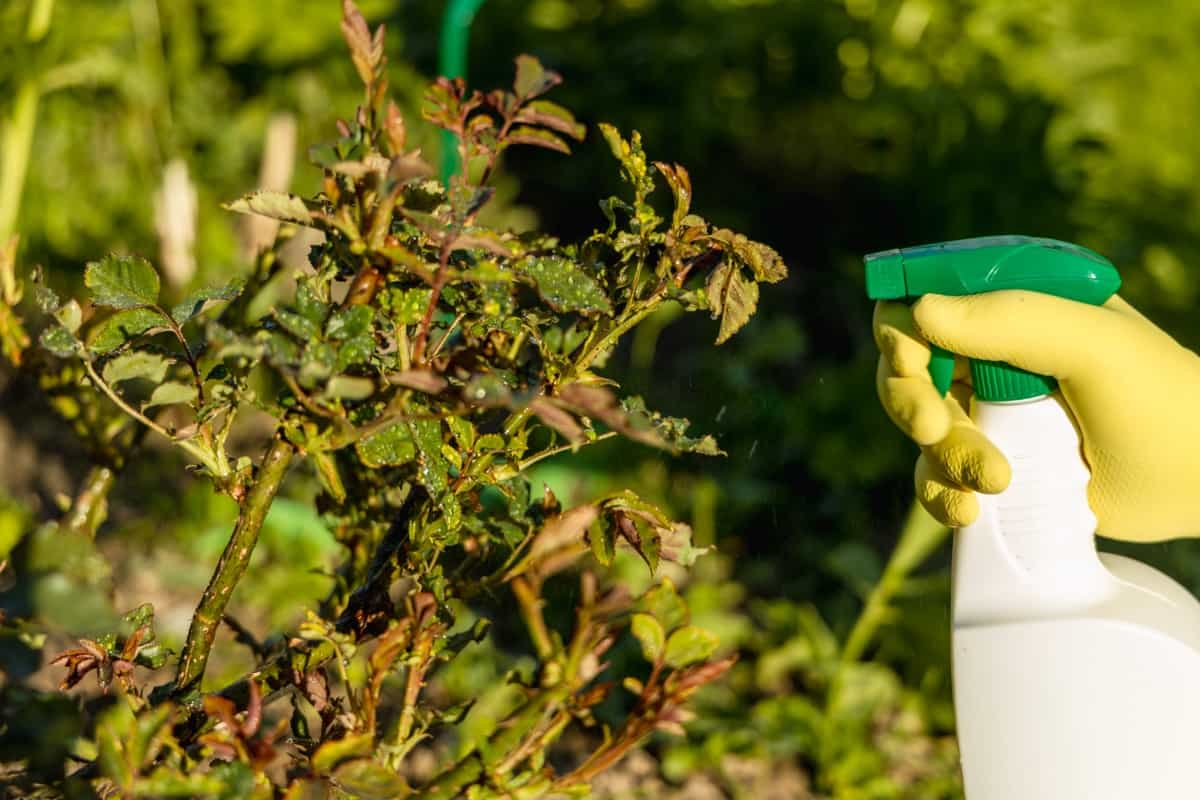
When using this homemade onion insecticide on your Rose plants, thoroughly coat both sides of the leaves, including any buds or flowers that may be present. Reapply every week or after rainfall to maintain its effectiveness. The strong odor emitted by onions is a natural repellent against aphids, thrips, and other common pests that love to feast on Roses. This method is not only safe for your plants but also environmentally friendly.
Eucalyptus Oil: A Natural Pest Repellent for Rose Plants
Eucalyptus oil is not only known for its refreshing scent, but it also serves as a natural pest repellent for Rose plants. This powerful essential oil has properties that keep unwanted insects at bay, protecting your precious Roses from damage. To make a homemade eucalyptus oil spray, simply mix a few drops of the oil with water and shake well. Then, evenly distribute the solution on your Rose plants, covering both sides of the leaves.
The strong aroma of eucalyptus acts as a deterrent to pests such as aphids, spider mites, and thrips. These tiny invaders dislike the smell and will steer clear of your beautiful Roses. Eucalyptus oil is also safe for beneficial insects like bees and ladybugs. Not only does this natural pest repellent keep bugs away from your Roses, but it also provides additional benefits. Eucalyptus oil can help reduce fungal infections commonly affecting Rose plants by inhibiting their growth.
Vinegar Solution: Homemade Pest Control Using Vinegar for Roses
When it comes to natural pest control for your precious Rose plants, vinegar might just be the secret weapon you’ve been looking for. The acidity of vinegar makes it a potent deterrent for many insect pests that tend to infest Roses. Aphids, mealybugs, and spider mites are just a few examples of the pests that can wreak havoc on your beautiful blooms.
To make this effective insecticide, you only need white vinegar and water. Mix vinegar and water and give it a good shake. Then, generously spray your Rose plants, covering both sides of the leaves and the stems. The strong scent and acidic nature of vinegar will repel insects while killing any existing ones on contact. However, it’s essential to remember that excessive use or high concentrations of vinegar may damage plant tissues.
So always test on a small area first and observe how your Roses respond before applying it more broadly. In addition to its pest-repellent properties, vinegar solution on your Roses can also help prevent fungal diseases like black spot or powdery mildew from taking hold. The acidic environment created by the application creates a sterile condition for fungi growth.
Tips and Safety Measures for Using Homemade Pest Control on Rose Plants
When using homemade pest control on your precious Rose plants, there are a few important tips and safety measures to keep in mind. These will ensure you effectively control pests while protecting your Roses’ health. Make sure to follow the instructions carefully when mixing homemade remedies. Using too many ingredients can harm your Roses rather than help them. It’s important to strike the right balance for effective pest control without causing any adverse effects. Additionally, avoid spraying homemade insecticides during sunny or windy days.
In case you missed it: How to Grow Rosemary from Seed to Harvest: Check How this Guide Helps Beginners
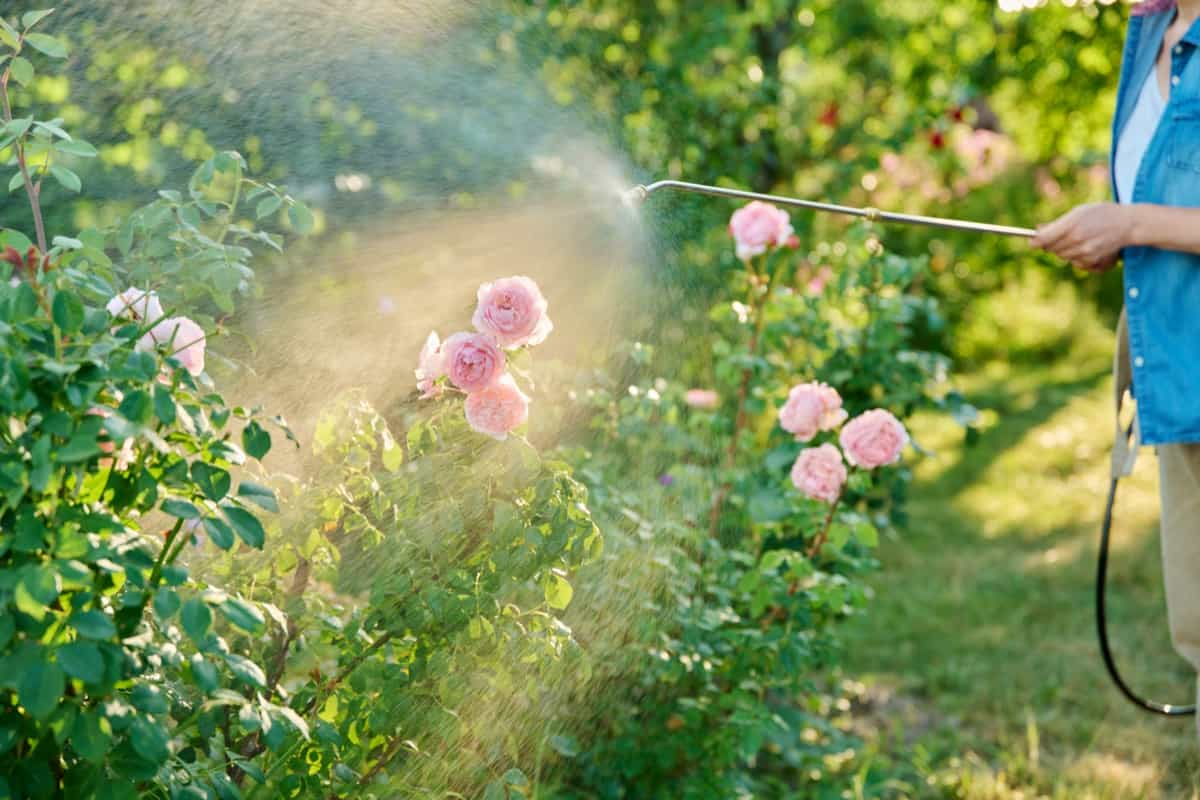
The heat can cause plants to burn, and wind can unintentionally spread the solution onto other plants. Choose a calm day with mild temperatures for optimal application. Furthermore, remember that natural remedies may need multiple applications before seeing results. Be patient and persistent in treating your Roses regularly until you notice a reduction in pests.
Frequently Asked Questions on Homemade Insecticide for Roses
What is a Homemade Insecticide for Roses?
Homemade insecticide for Roses is a natural and DIY solution that controls pests on Rose plants without harmful chemicals. It typically consists of ingredients that repel or kill insects, such as soap, oil, garlic, chili peppers, and even essential oils.
Is Homemade Insecticide Effective Against All Types of Pests?
While homemade insecticides can be effective against many common garden pests like aphids and mites, their effectiveness may vary depending on the specific pest species infesting your Roses. Some pests may require professional-grade chemical treatments or alternative methods.
In case you missed it: 18 Common Rose Plant Problems: How to Fix Them, Solutions, and Treatment
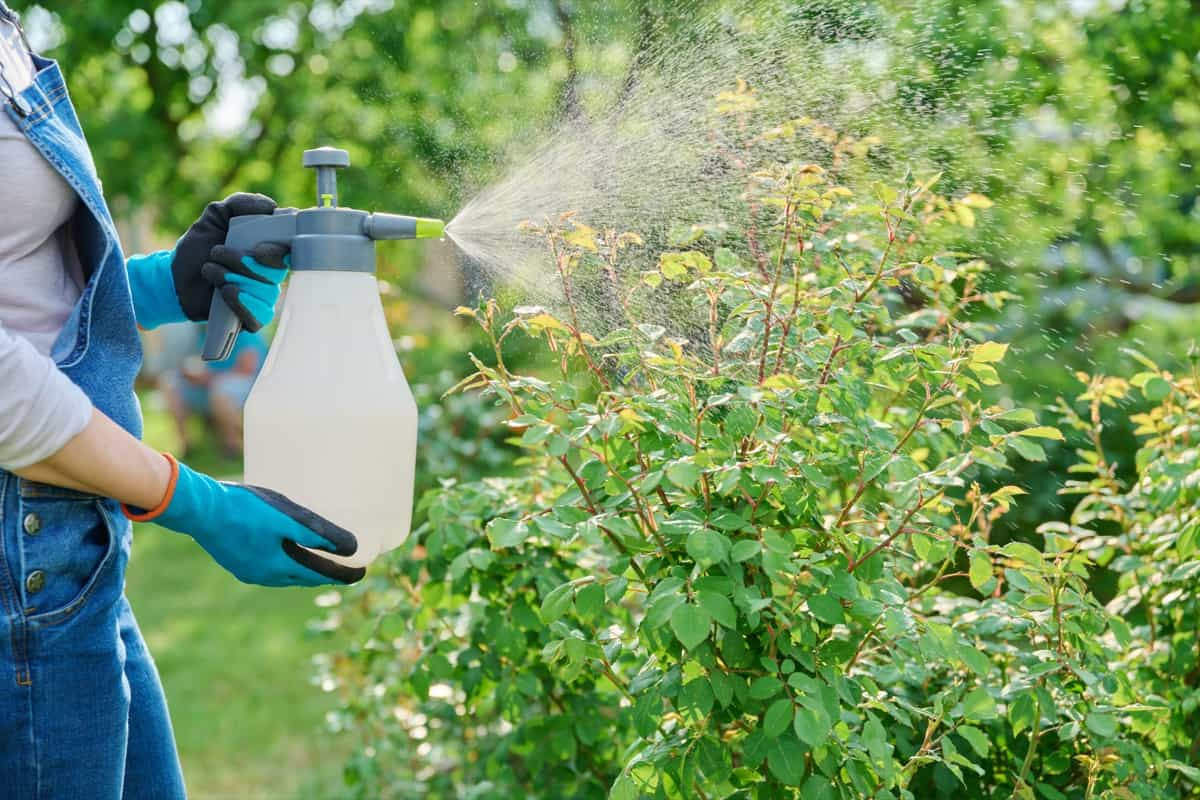
Conclusion
Homemade pest control remedies for Roses are a natural way to protect your plants from pesky pests. It is important to note that while these homemade solutions are safe for the environment and your plants, it’s still crucial to follow some safety measures. Always extensively test a small area of your Rose plant before applying any homemade insecticide.
Also, avoid spraying during hot temperatures or when the sun directly shines on the leaves. By including these natural pest control methods into your gardening routine allows you to enjoy beautiful and healthy Roses without relying on harmful chemicals.
- How to Grow Hibiscus from Flower
- Plantation Ideas for Home Decoration: A Beginners Guide
- Flower Garden Designs and Layouts for Beginners
- Planting and Spacing Techniques in Papaya: A Beginner’s Guide
- Growing Gold: Essential Techniques for Planting Pineapples
- How to Make Kalanchoe Plant Bushy: Home Remedies and Solutions
- 11 Reasons Why Your Gardenia is Not Blooming: Home Remedies and Solutions
- Eco Elegance: The Guide to Designing a Drought-Tolerant Landscape
- Gardening on a Slope: Strategies for Hillside Landscaping
- Nourish and Flourish: Top Organic Mulches for Thriving House Plants
- Everything You Want to Know about Indian Mogra Flower: Discover Uses and Growing
- Green Thumb Success: Expert Tips for Cultivating Greenhouse Pumpkins All Year Round
- Maximize Growth & Flavor: The Ultimate Guide to Companion Planting in Herb Gardens
- How to Control Rhododendron Problems Naturally: Home Remedies and Organic Ways to Fix Them
- Natural Magic: The Remarkable Benefits of Cinnamon for Plants
- Best Steps to Revive Dying Tulip with Natural and Organic Treatment
- 10 Reasons Why Your Angel Trumpet is Not Blooming: Remedies and Treatment
- How to Fix Periwinkle Leaf and Flower-Related Problems: Natural Remedies and Solutions
- How to Fix Zinnias Leaf and Flower Problems: Discover Natural and Home Remedies
- Organic Steps to Induce Lemon Tree Flowers: A Comprehensive Guide
- Bloom Booster: Crafting the Perfect Homemade Bougainvillea Fertilizer
- Optimizing Growth: A Guide to Applying NPK Fertilizer for Potted Plants
- 10 Best Homemade Fertilizers for Rubber Plant: DIY Recipes and Application Method
- How to Boost Female Pumpkin Flowers: Effective Steps for More Flowers and High Yields
- Transform Your Indoor Garden: Top Benefits of Pink Salt for Houseplants
- 10 Best Homemade Fertilizers for Peacock Plants (Calathea): Easy DIY Guide
- Unlock Blooms: 9 Reasons Why Your Potted Chrysanthemum is Not Blooming
- 8 Reasons Why Your Potted Hibiscus is Not Blooming: Fix it with Simple Solutions
- Unlock Blooms: 9 Key Reasons Your Potted Frangipani Won’t Flower
- 10 Reasons Why Is My Ice Plant Not Blooming: Remedies and Treatment
- 10 Reasons Why My Potted Hydrangea Not Blooming: Treatment and Remedies
- 10 Reasons Why is My Wisteria Not Blooming: Remedies and Treatment
- 10 Reasons Why is My Goldfish Plant Not Blooming: Remedies and Treatment
- Maximize Your Space: Ultimate Guide to Balcony Gardening with Grow Bags
- 10 Reasons Why Your Iris is Not Blooming: Remedies and Treatment
- 10 Reasons Why Your Anthurium Plant is Not Blooming: Treatment and Remedies